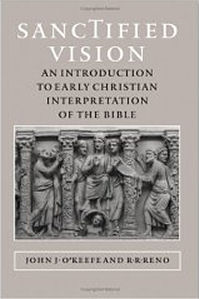
|
Posted September 2, 2005
Book: Sanctified Vision: An Introduction to Early Christian Interpretation of the Bible Authors: John J. O’Keefe and R.R. Reno The Johns Hopkins University Press, Baltimore, MD pp. 156 An Excerpt from the Jacket:
This approach is organized around three basic analytic strategies: literal, typological, and allegorical. The literal strategy is a rigorous and extensive analysis that identifies particular word associations that intensify scriptural meaning. The typological strategy interprets distinct patterns of events within scripture and applies those patterns to other events in scripture and the history of the church. The allegorical approach to biblical reading, like the typological strategy, seeks patterns in the text, but these patterns are more diverse and represent larger themes or beliefs of the early church. Within this analytic framework, the authors explain the larger structure of patristic exegesis and argue for the importance of this structure in the emergence of Christian orthodoxy. An Excerpt from the Book: Vince Lombardi is a great source of athletic wisdom. “In truth,” he is reported to have said, “I have never known a successful man who did not appreciate the discipline that it takes to win.” Lombardi’s observation seems obvious, but the bite of the maxim is less in the speaking than in the implementation. He understood that the requirements of discipline applied equally to the player’s skilled application of their rules of football and to his character as a man: both forms of discipline guide toward success. The same holds true for the church fathers. They knew that inspiration can deliver insight whenever and to whomever it will, just as some gifted athletes seem able to manage victory without discipline. As Augustine observes at the outset of his treatise on scriptural interpretation, some attain wisdom by the direct action of the Holy Spirit. Nonetheless, just as Vince Lombardi exhorted his players to strive with disciplined effort so also did Augustine and the early Christian tradition as a whole, conceive of the interpretation of scripture as an endeavor best pursued with a similar focused exertion. They found scriptural support ready at hand: A wise child loves discipline (Prov 13:1). Table of Contents: 1. Scriptural meaning modern to ancient 2. Christ is the end of the law and the prophets 3. Intensive reading 4. Typological interpretation 5. Allegorical interpretation 6. The rule of faith and the Holy Life |
|
